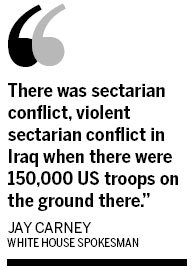US speeds up drone, missile deliveries to Iraq
The United States said on Monday it would speed up its deliveries of missiles and surveillance drones to Iraq as the Baghdad government battles a resurgence of al-Qaida-linked militants.
The White House, meanwhile, dismissed claims that the fighting, which has seen militants retake the city of Fallujah, was a result of US President Barack Obama's decision to withdraw US troops.
US Vice-President Joe Biden spoke by phone with Iraqi Prime Minister Nuri al-Maliki, and "expressed concern for those Iraqis who are suffering at the hands of terrorists", a statement said.
"Maliki affirmed the importance of working closely with Iraq's Sunni leaders and communities to isolate extremists."
Biden also spoke with Iraqi Council of Representatives Speaker Osama al-Nujaifi.
Biden "praised the recent cooperation between Iraqi Security Forces and Sunni local, tribal, and national leaders in the fight against the Islamic State of Iraq and the Levant currently unfolding in Anbar Province", the White House said.
"Nujaifi reaffirmed his commitment to Iraq's fight against terrorism," it added.

The Pentagon said Washington would accelerate the delivery of 100 more Hellfire missiles, which were due to be sent to Iraq in the next few months.
US Colonel Steven Warren said an additional 10 ScanEagle surveillance drones would also be delivered.
Hellfire missiles, originally designed as an anti-tank weapon, can be fired from helicopters and warplanes.
ScanEagle drones are a low-cost 3-meter aircraft capable of flying 24 hours.
The deliveries correspond to contracts already signed with Iraq. Some 75 Hellfire missiles were delivered to Baghdad in mid-December, US officials said.
Since then, Iraq has seen a resurgence of fighting in the province of Anbar, which was a key insurgent stronghold for years following the US-led invasion of Iraq in 2003.
Last week, fighters from the al-Qaida-linked Islamic State of Iraq and the Levant reclaimed Fallujah, scene of some of the bloodiest fighting of the Iraq war between US troops and insurgents.
Warren said Washington was working with Iraq to develop a "holistic strategy to isolate al-Qaida-affiliated groups so the tribes working with the security forces can drive them out of the populated areas".
But he reiterated previous statements from US Secretary of State John Kerry that no US forces would return to Iraq to assist in military operations.
"We'll not be sending forces to Iraq," he said.
Instead, the US will continue to provide intelligence to assist and advise the Iraqis at a "ministerial level" through some 100 military personnel still based at the US embassy in Baghdad.
The assistance would not extend to operational advice. "We're not doing tactical work with the Iraqis," Warren said.
Despite the withdrawal of US forces from Iraq at the end of 2011, the US remains a key security and defense partner, providing more than $14 billion worth of weapons to Baghdad since 2005.
Following the renewed fighting, the White House has been forced to rebut claims that the militants are filling a vacuum left by the departure of US forces.
"There was sectarian conflict, violent sectarian conflict in Iraq when there were 150,000 US troops on the ground there," said White House spokesman Jay Carney.
(China Daily 01/08/2014 page11)


















